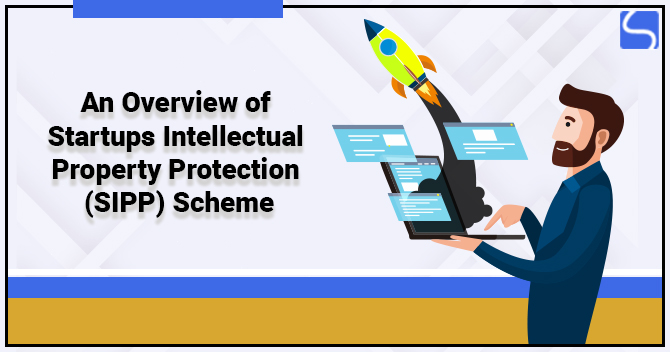An Overview of Start-ups Intellectual Property Protection (SIPP) Scheme

Karan Singh | Updated: Jul 08, 2021 | Category: Intellectual Property
The Indian Government support start-ups launched the Start-ups Intellectual Property Protection Scheme (SIPP). This scheme was commenced to reach out to start-ups and safeguard & encourage their IPR (Intellectual Property Rights) and thus promote creativity and innovation among entrepreneurs. The Scheme began on a pilot basis in Jan 2016 and was in force up to Mar 2020. The DPIIT (Department of Promotion of Industry and Internal Trade) has examined that the Start-ups Intellectual Property Protection Scheme is now broadening further for three years, that is, up to March 31, 2023.
In India, start-ups that have limited human resources and resources can only uphold themselves via continuous evolutions in their innovations and development. This makes Intellectual Property Right (IPR) Protection even more essential for start-ups. In this blog, we bring you details of a scheme known as the Start-ups Intellectual Property Protection (SIPP) Scheme.
Table of Contents
What is the Purpose of Start-ups Intellectual Property Protection (SIPP) Scheme?
- The Start-ups Intellectual Property Protection (SIPP) Scheme is focused on encouraging Intellectual Property Rights Registration (such as Copyright Registration, Trademark Registration & Patent Registration), awareness and promoting creativity and innovation;
- The Start-ups Intellectual Property Protection (SIPP) Scheme envisages guiding emerging technologies among start-ups and aiding them to commercialise them by way of giving access to high-quality Intellectual Property (IP) services & resources.
What are the Benefits of Start-ups Intellectual Property Protection?
Following are some significant benefits of Start-ups Intellectual Property Protection:
- To encourage awareness and promote Intellectual Property Rights protection amongst start-ups, the scheme for Startups Intellectual Property Protection launched;
- The Government would pay supposed professional fees for the service3s concerning getting the IPR (Intellectual Property Rights) to the advocates or Trademark agents in charge of handling the Intellectual Property Right process;
- According to the scheme, facilitators will not levy anything from a start-up. The fees are paid straight by the Government;
- Start-ups can get Trademark, Patent, and Design services by paying them only needed legal fees, and professional fees are excluded as a part of the SIPP Scheme;
- Start-ups can get a complete start-to-end array of services under this Start-ups Intellectual Property Protection Scheme, consisting of general advice, helping in drafting applications, filing and preparing responses to examination reports, appearing at contest opposition, hearings and ensuring the final disposal of the application of IPR (Intellectual Property Rights);
- For effective execution of the scheme, the DPIIT has empanelled different facilitators, who are required to provide Intellectual Property Right related services to start-ups;
Eligibility Criteria for SIPP Scheme
Following is the eligibility criteria for the Start-ups Intellectual Property Protection Scheme:
- In this scheme, a start-up is a company that has been registered in India or not more than seven years before the application;
- The company shall cease to be a start-up if its turnover for the early financial years has more than Rs. 25 crores or it has completed seven years from the registration date;
- The company should be working towards the development, commercialisation, or innovation of new products and processes or services which are driven by technology;
- A start-up shall be entitled to getting the benefits of this scheme only after it has procured certification from the start-up certification board;
- The yearly turnover should not more than Rs. 25 crores in any preceding financial year;
- Moreover, the company is not formed by the splitting up or reconstruction of a business already in existence.
Operation of the Start-ups Intellectual Property Protection Scheme
- The Government has also empanelled Intellectual Property facilitators (Trademark Attorneys and Patent Agents) who will be working with Start-up’s filing & prosecuting Patent applications;
- The Start-ups Intellectual Property Protection Scheme, firstly made to last until March 2020, has now been extended by three years to last until 31st March 2023. Around 44,534 start-ups have already been recognised by the DPIIT (Department for the Promotion of Industry & Internal Trade) as of 24th February 2021;
- The plan comprises a fast-track examination of Patent applications and a rebate in fees.
Who can Apply?
Any start-up acknowledged in terms of the notification of GSR 180(E)[1] published in Part 2, Section 3, Sub-Section (i) of the Gazette of India dated 17th Feb 2016, as may be changed from time to time. The Certificate of Registration (COR) given by DIPP may be confirmed from the Start-up India website.
The start-ups covered under the SIPP scheme will not be required to procure a certificate of an entitled business from the Inter-Ministerial Board of Certification. But, start-ups will be required to give a self-declaration that they have not availed funders in any other government scheme for the aim of paying the Patent agent/Trademark Agent/facilitator for prosecuting and filing their Intellectual Property application.
Significance of Intellectual Property Right (IPR) for Start-ups
The Intellectual Property Protection (SIPP) Scheme for Start-ups underscores the significance of protecting Intellectual Property Rights for a start-up.
It’s ideal for an initial stage of business to protect ownership over Intellectual Property (IP) such as Patents, Brand Names, and Trademarks. This is because, in the case of a possible violation, like someone else using a similar logo, name, or goodwill, it is easier to set up your rights over Intellectual Property. Most inventors, while taking a call on your start-up business’s worth, also feature in the Intellectual Property that you may increase in future. For those into inventions of a scientific nature, it is totally vital to seek a Patent Registration as the starting phase as the average time taken from filing to the actual granting is around five years in India.
Conclusion
The Start-ups Intellectual Property Protection (SIPP) Scheme is focused on encouraging Intellectual Property Rights Registration, awareness and promoting creativity and innovation. The scheme does not in any way allow the facilitator or the start-up to grant or register, as the case may be of the Intellectual Property Rights; the applications shall be disposed off as per the relevant rules and laws.
Read our article:Avoidable Common Intellectual Property Errors before Introducing the Website














